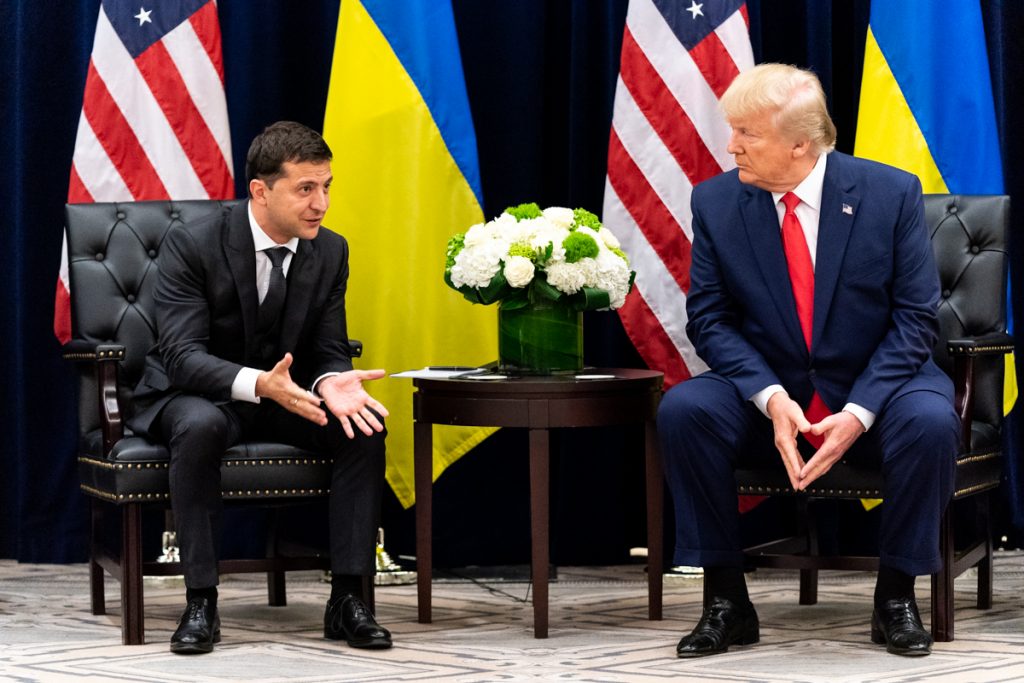
Although branded a spy by President Trump for blowing the whistle on Trump’s insidious attempt to withhold $391 million in 2019 military aid to Ukraine, allocated to fend off Russian aggression, the whistleblower is the ultimate U.S. patriot.
Senator Dick Durbin (D-Ill), the top Democrat on the Senate Appropriations Defense subcommittee, said the 2019 funds were finally released on September 11, after Trump inexplicably froze them since May, enraging Congress.
The U.S. has provided aid to Ukraine since the Soviet Union crumbled in the early 1990’s to keep the former USSR territory in NATO’s fold.
It’s sadly ironic that if Trump ordered his highly-regarded intelligence community Inspector General, Michael Atkinson—who reported the whistleblower complaint to Congress without mentioning her or his name—to disclose the whistleblower’s identity, Trump could do so, according to a 2014 policy directive initiated by President Obama.
“Notably, analysts said, President Obama’s directive puts the President in charge of enforcement, which is particularly ironic in this case, given Trump is the subject of the complaint,” The Washington Post reports.
Obama’s intent was to bolster the whistleblowers’ protection by “spelling out how intelligence community inspectors general could seek to determine if whistleblowers faced retaliation and recommend corrective action,” the Post reports.
“Before Obama, whistleblowers in the federal government have long had limited remedies if they face retaliation for reporting wrongdoing, and those in the intelligence community have even fewer than their counterparts in other agencies.
“The 1998 Intelligence Community Whistleblower Protection Act [passed by George H.W. Bush] did not actually detail any protections for whistleblowers from retaliation—instead merely describing the process to make a complaint,” the Post reports.
Trump Shielded by Executive Privilege
“There really isn’t much to stop Donald Trump from ordering the disclosure of the identity of the whistleblower,” Vox reports.
“He himself is arguably beyond the scope of the legal restrictions. Any of those normal provisions don’t really apply to the President because the President is the head of the executive branch… so it’s unlikely there’s any viable legal recourse that could be taken in that situation.
“The only recourse that is envisioned is political and it’s namely impeachment,” Vox writes.
Vox notes if Trump ordered his Inspector General to disclose the whistleblower’s identity, the Inspector General would have to do so.
“And Trump could then tweet the whistleblower’s name, opening him up to all manner of harassment, and perhaps even physical danger,” Vox concludes.
Right-wing operatives offered a $50,000 bounty for any information relating to the whistleblower’s identity, prompting whistleblower attorney, Andrew Bakaj, to warn Director of National Intelligence Joseph Maguire of possible threats to his client’s safety.
Extraorindary Measures to Conceal Identity
House Democrats, preparing for the whistleblower’s testimony, are considering extraordinary measures to protect her or him, such as disguising the whistleblower’s voice in Congressional closed-door hearings, as Congress is not obliged to withhold the whistleblower’s identity.
The only individual obliged to withhold the whistleblower’s identity is Inspector General, Michael Atkinson, whose determination that the whistleblower’s report was urgent enough to warrant Congressional oversight, led to the current impeachment inquiry.
The whistleblower is reportedly a CIA officer who was detailed to the White House.
Laws Directing Whistleblower Protection
“Congress has enacted a hodgepodge of laws covering various aspects of whistle-blowing through approved channels,” The New York Times’ Charlie Savage reports.
“For example, the Civil Service Reform Act of 1978 forbids interfering with or denying federal employees a right to furnish information to lawmakers. The Inspector General Act of 1978 prohibits officials from threatening the jobs of or making other reprisals against federal employees who complain or disclose information to an inspector general in good faith.
“Congress bolstered that rule with the Whistle-Blower Protection Act of 1989, which covers most federal employees, including most State Department officials. Among other things, it protects them from adverse personnel actions — like being fired — taken in reprisal for reporting potential wrongdoing via the authorized channels.
“Intelligence officials are covered by a different law, the Intelligence Community Whistle-Blower Protection Act, which Congress passed in 1998 and later amended. The Obama administration enhanced it with two major policy directives.
“If the Inspector General decides a complaint is credible and presents an urgent concern, the Director of National Intelligence is supposed to send it to Congress. If the Inspector General rejects it, the whistle-blower may still then talk about it to lawmakers with protections from reprisal so long as he or she obeys rules for protecting classified information,” Savage concludes.



Was Obama the object of the whistleblowers complaint in the 2014 opinion? My guess is he was not. When the whistle blower is making ca complaint against the party who has ultimate authority over him or her, disclosure creates a danger to the whistleblower. I think it is sui generis. If the inspector general advised that whistle blower of his intention to make disclosure, he should at least give the whistleblower chance to petition the court to stay that disclosure.
I think if Atkinson were forced to tell Trump who the whistleblower is, we’d have another Saturday Night Massacre, which should have happened when Sessions was fired.